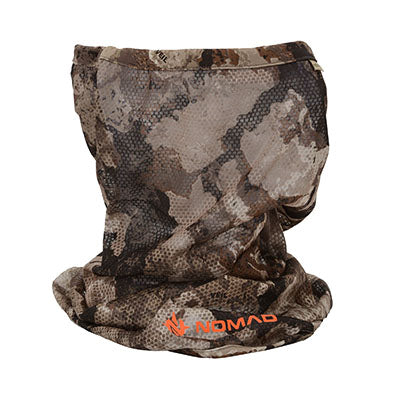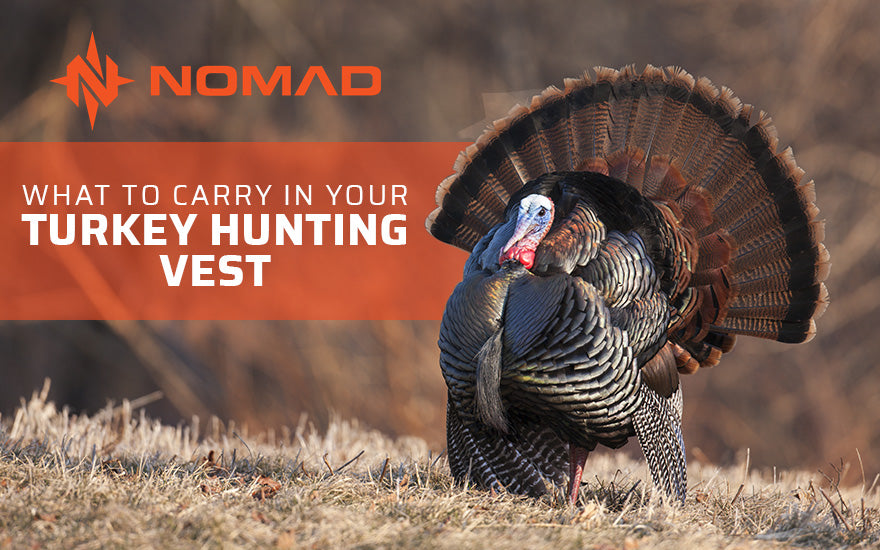
If you're a dedicated turkey hunter, you know how much equipment is involved with every expedition. Along with all the decoys, blinds and other necessities of the actual hunt, you may have a plethora of calls, gear and maybe even a granola bar tucked away in your turkey hunting vest.
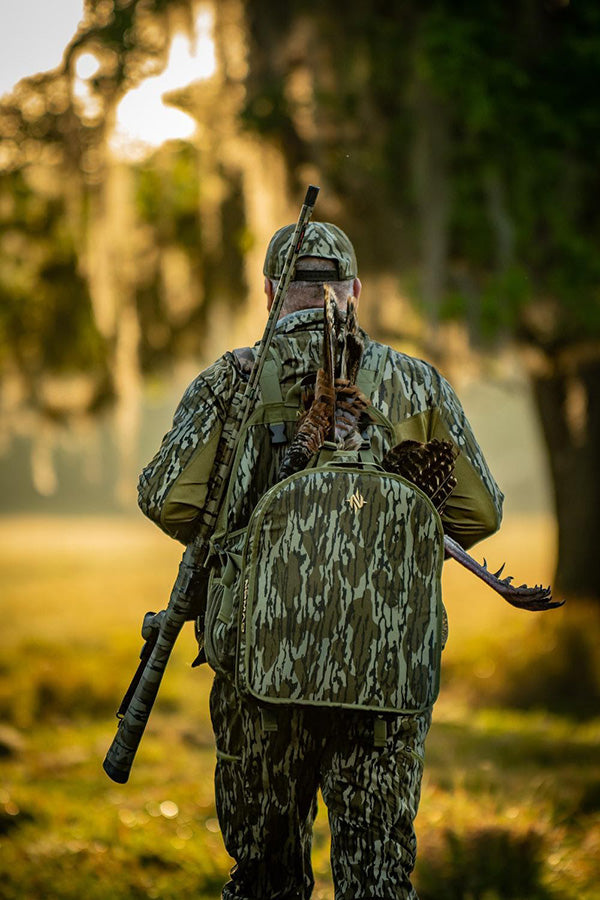
If you're new to turkey hunting, you may be wondering what to bring in your vest–a piece of clothing designed to keep all the portable gear on your person. Here are some things you should carry in your turkey vest that you may not have considered.
Turkey Calls
Bringing calls along may seem like a no-brainer, but there are different kinds of calls to bring with you. You'll use different calls in separate situations and may even need a device to make sure all your calls are working well.
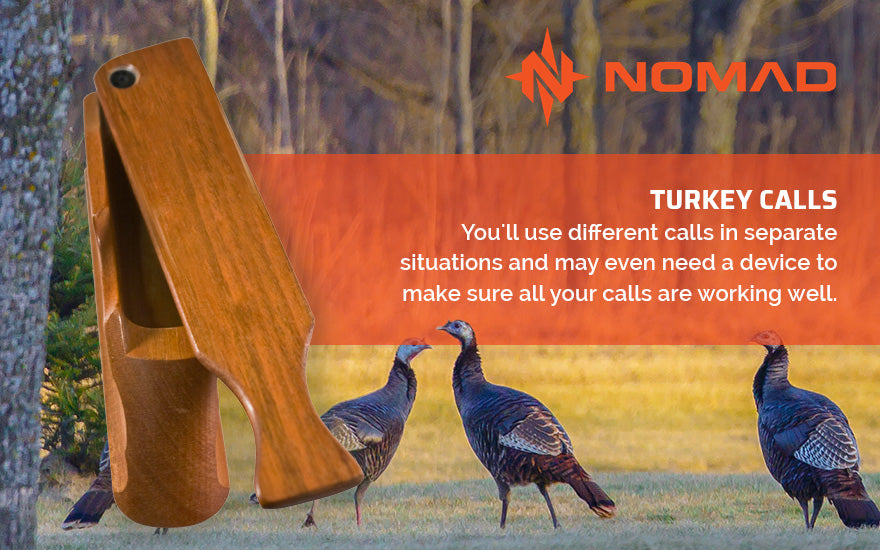
Friction calls are a surface and striker combination and create the purrs, clucks and yelps of a hen to trick any tom within hearing distance.
Diaphragm calls make excellent turkey sounds, even the long kee-kee sounds that toms often mistake for available hens.
Tube calls are also called snuff can calls and produce long-ranging, sweet hen sounds to attract those gobblers loitering far away from your spread.
Finally, locator calls make the sounds of other birds to elicit a shocked gobble from any toms in the underbrush.
There are other calls out there, so it makes good sense to bring a call conditioner along with you. These tools have everything you need to condition and maintain your calls right there on the hunt, so you won't be weighed down by obsolete equipment.
Shop Turkey Hunting GearRangefinder
These devices are handy on the hunt as you can quickly calculate how far away your prey is without a lot of movement on your part, especially if you have it tucked away in your turkey vest.
You can find rangefinders on cameras and guns, but you can also buy them separately to use when you're bow hunting or handling a shotgun sans range finder.
Compact Binoculars
Along with a rangefinder, a pair of binoculars is helpful on a hunt to pinpoint where your prey is. It will also help you determine a turkey's line of travel.
Toms and hens move in flocks, and sometimes it may seem as if they have no determined course. This isn't the case, however. Turkeys in flocks travel in one general direction and, although they may zig-zag around, they will follow this established direction as they move around their habitats. In particular, wild turkeys reside in riparian zones (stream beds), grasslands, pine forests and pastures.
A pair of binoculars can help you maintain a line of sight on your prey despite the environmental obstacles. And, of course, your binoculars should be compact enough or fold down so you can easily store them away in your vest.
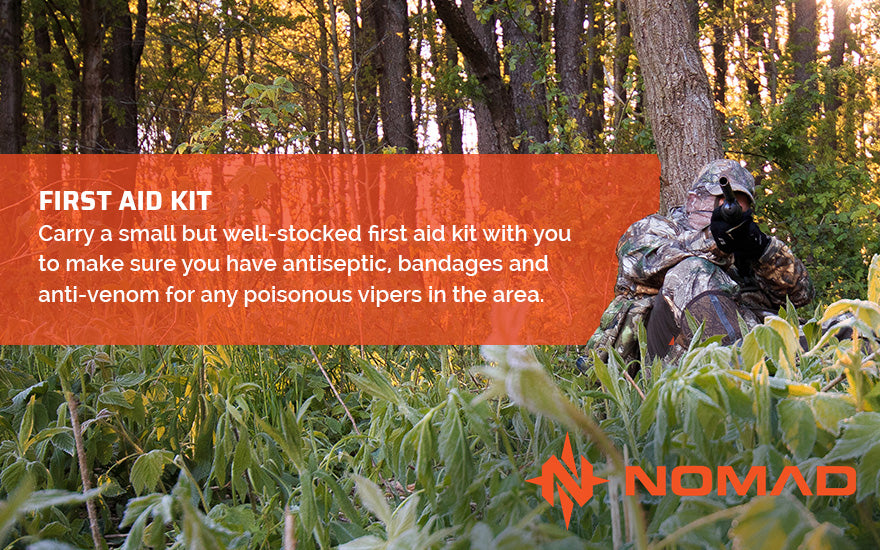
First Aid Kit
You never know when disaster may strike, so it pays to be prepared. Carry a small but well-stocked first aid kit with you to make sure you have antiseptic, bandages and anti-venom for any poisonous vipers in the area.
Although a venom extractor may seem like overkill, it can also help in extracting wasp or bee stings, or even a particularly stubborn splinter.
Bug Repellent/Sunscreen
Sometimes you can find both of these useful products in one bottle. If you can't find one product that both protects your skin from UV rays and repels biting insects, carry small, compact bottles of each in your turkey vest.
Hunters are particular about what types of lotions or ointments they bring out with them on the hunt. You don't want a repellent to smell too strongly as any chemical or non-natural scent will tip off your prey that a human is nearby.
Look for products that are scent-free or as close to it as they can come. Most hunters have a specific brand they use religiously.
If you need additional protection, consider purchasing a hunting gaiter for your next trip. A gaiter can help shield your face from the sun and pesky bugs.

Headlamp
Turkeys are most active in the morning and early afternoons, and when the weather gets foul, they usually head for cover. That doesn't mean your hunt will be entirely in the daylight hours, however.
Hunters often find themselves setting up in the early pre-dawn light or breaking down after the sun sets. A headlamp is always a good idea for any outdoor endeavor. And since turkey hunting is such a gear-heavy activity, it is wise to bring one along in your turkey vest.
That way, when you're headed out after a hunt, you can scan the area and make sure you haven't left anything behind. Ensure your flashlight is made to be outdoors with a rugged, waterproof exterior that will not break easily.
Rain Gear
Another crucial piece of equipment is protective rain gear, including a jacket, hat and even pants, if you can fit them in your vest. A lot of quality rain gear is handily compressed down into a small size.
If you can compact your rain gear so that it will fit conveniently into your vest, you will be a happy hunter if the clouds open in a rain shower.
Garbage Bags
These items don't automatically occur to people when they're planning what to bring, but it can be infinitely useful out on the hunt. If, for example, you have forgotten your rain gear, you can use one of these bags as a makeshift raincoat by cutting a neck hole and armholes in it.
If you've also forgotten a seat pad for the long hours of waiting by your spread, you can use a garbage bag so that the damp won't seep through your clothes.
You can also use a garbage bag to pack out a dead bird and encase any blood to minimize the mess and avoid attracting predators to the smell of blood.
All-in-One Tool
In case you have been caught in the rain without your rain gear and need to make a garbage bag into a raincoat, you'll need a tool to do it well. An all-in-one tool with snippers, a well-sharpened knife and other essentials have saved many a hunter's expeditions.
There's no telling what you'll need once you're out there, so having a tool that has a bit of everything attached can turn around a failing expedition.
Cutters
This device is slightly different than an all-in-one tool or an OTF knife. Many companies make collapsible saws or pruning shears so hunters can deal with poking roots and branches efficiently.
You can also clear away an alley for your shooting range to ensure a clear shot at the toms, or collect material to build a brush blind.

Decoys and Extra Stakes
You may be wondering how you can carry a decoy in your turkey vest, but many companies are now making collapsible decoys that do just that. An extra collapsible turkey decoy could make a failing hunt a successful one with a little rearrangement of your spread.
Opt for a decoy that is a quality product. Toms aren't necessarily the smartest creatures in the animal kingdom, but what they lack in intellectual power, they make up for with wariness and instinct. If they sense your decoy bird looks unnatural, they will take off.
Stakes may be even more critical. When setting up your spread into a desirable configuration, you do not want to run out of stakes to put up your decoys. Turkeys will become alarmed if the birds they're checking out lean off to one side in a lopsided manner. Stake your decoys straight up and down for the most natural look.
Too much or too little movement will also throw the real birds off. You don't want your decoy to be frozen and lifeless, but you also don't want it jumping around in every breeze. Somewhere in the middle is the sweet spot.
If you have some extra stakes tucked into your turkey vest, you can prop them up against the decoy's tail so that it can move a little bit, but not too much.
Water and Food
Hunting is often a waiting game, and there's nothing worse than waiting on an empty stomach. Also, monitor your hydration carefully on the hunt to avoid dehydration.
Tuck a granola bar and a container of water into your turkey vest to ensure you do not become hungry and dehydrated while you wait near your decoy spread.
Additionally, consider how strongly your food smells. Turkeys might be alarmed if the area is suddenly inundated by the smell of garlic bread or tuna fish. Keep your snacks simple and portable.
Compass, Map and Hunting License
In this digital age, we aren’t used to having a map tucked into our back pockets. However, when you're planning on an expedition into the woods for multiple hours, you should be capable of finding your destination and your car without relying entirely on a digital, electrical device.
There are no outlets in the woods, although you could bring a portable charger with you in your turkey vest as well. Part of the challenges of hunting is the long periods exposed to the elements. If you hate putting yourself in this type of situation, know how to work a compass and use a map, even if you never need it.
Since a quality turkey vest has so many pockets, you can find one for your hunting license as well. You may not catch a single glimpse of a warden on your hunt. On the other hand, you may have one asking you for your license, and you don't want to come up wanting.
Pack your license in a Ziploc bag to keep it away from the damp.
Toilet and Cleaning Supplies
These items also can be useful as an addition to your first aid kit, but you'll want to keep them separate so as not to incur infection.
Bring a Ziploc bag with some tissue paper or baby wipes in your turkey vest. When nature calls, you'll be prepared with dry paper, a must in this situation. Make sure to bring the biodegradable type of toilet paper, so you don't have to pack it out with you.
When nature does call, pick an area well away from your spread and hunting grounds and note the wind direction. Any scent of humans alerts the animals and birds nearby to your presence and head them off.
If you or someone you're with has a laceration, you can also use the wipes to clean the wound of any debris.
Dry Socks
This item seems like a luxury, and maybe it is, but it's a necessary luxury. If you have enough room left in your turkey vest after you've packed away all the other essentials, consider tucking in a lightweight pair of wool socks.
There is nothing more miserable than standing around for hours in wet socks (unless you are also hungry and thirsty). Hunts are exciting, but they also expose you to the elements for many hours at a time.
Even if you have the highest tech, weatherproof boots, accidents happen and sometimes your socks get wet. If that does occur, you can whip out the socks you have in your vest and swap them out.
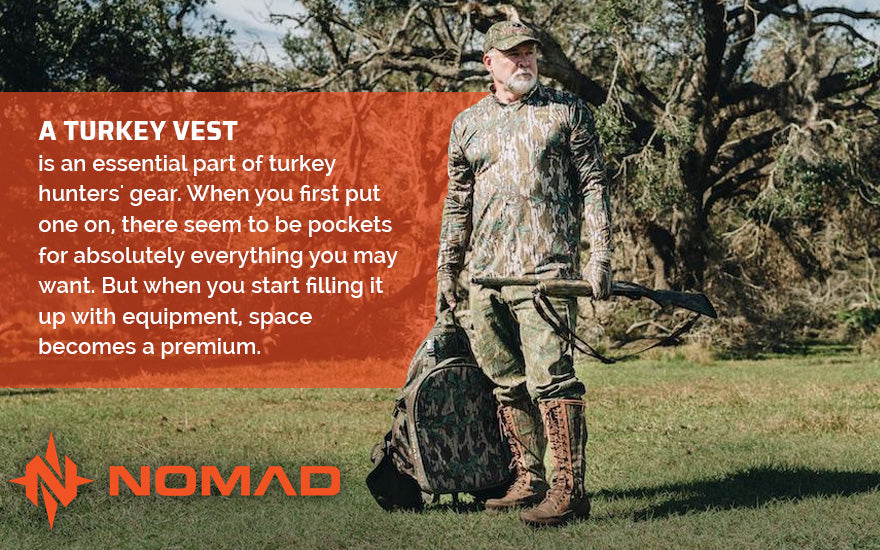
Final Thoughts
A turkey vest is an essential part of turkey hunters' gear. When you first put one on, there seem to be pockets for absolutely everything you may want. But when you start filling it up with equipment–no matter how roomy it is–space becomes a premium.
Pack the necessary key components to bring on your hunt in your turkey vest to avoid first aid issues, bug bites, hunger, cold and damp. And when you're on your way back to your vehicle with a hopefully full trophy bag after a successful hunt, you'll be glad your socks are dry.
Nomad understands that you have high expectations for your equipment. The success of your hunt often relies on the quality of your gear, and we want to make sure you're outfitted with the very best on your next turkey hunt.



